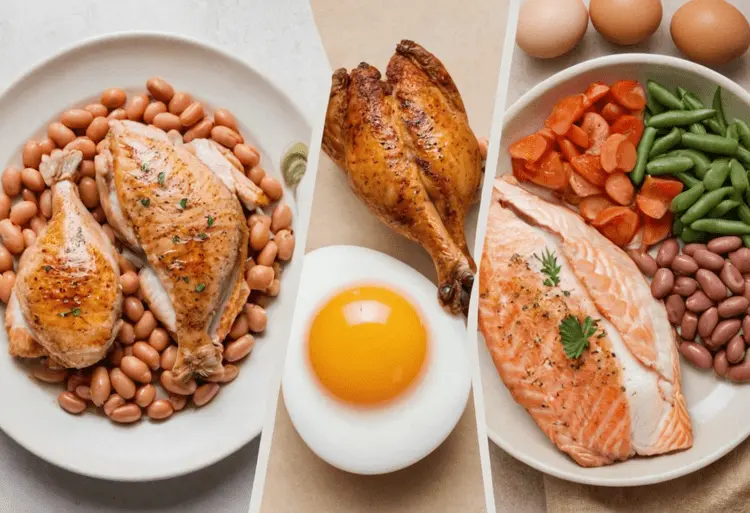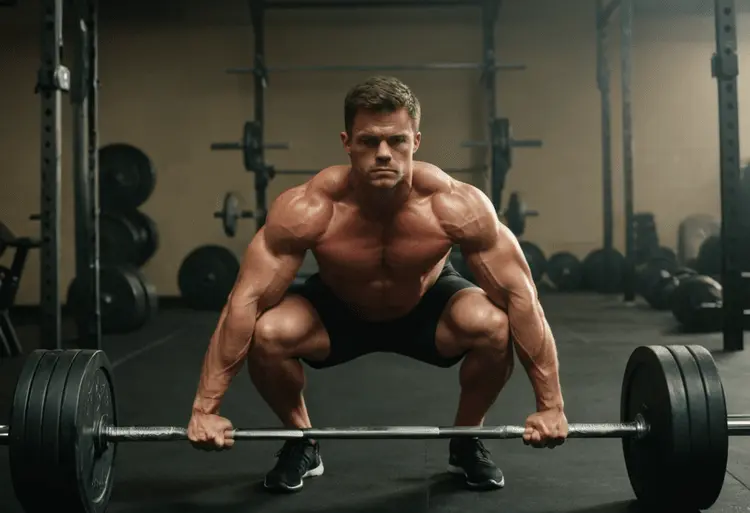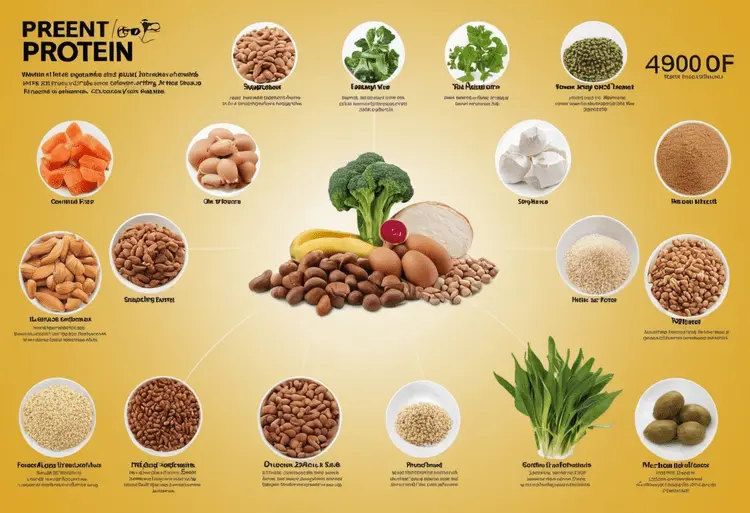Feeling lost in the world of protein? Confused by terms like protein metabolism, amino acids, and high-protein diets?
Are you struggling to build muscle, optimize your health, or get clear answers to your protein-related questions?
Dive deep into the fascinating world of protein metabolism! This comprehensive guide unravels the mysteries of protein synthesis, breakdown, and its impact on your fitness and wellbeing.
Learn how to leverage protein for your athletic goals, boost your overall health, and get expert answers to all your burning questions.
Protein Metabolism: The SparkNotes Version
- Protein builds and repairs
- Needs vary by person
- Made of amino acids
- Hormones play a role
- Impacts weight management
- Athletes have needs
Table of contents
Introduction & Foundations

Understanding Protein Metabolism – The Key to Health and Fitness
Think of your body as a master builder, constantly working on projects. Protein is its favorite building material. Protein metabolism is the whole process – getting supplies, building structures, even some demolition when needed!
Understanding protein metabolism unlocks the secrets to better health, whether your goal is building muscle, managing weight, or simply feeling your best. Ready to dive in?
Your Protein Requirements: It’s Not One-Size-Fits-All
How much protein do you really need? Is more always better? The answer depends on many things.
Your age, how active you are, and your overall health all play a role. Think of protein needs like shoe sizes – there’s a range, and the perfect fit makes all the difference.
Here are some things that can boost your protein needs:
- Pregnancy & breastfeeding: Growing a tiny human takes extra building blocks!
- Athletes: Those muscles need raw materials for repair and growth.
- Older adults: Protein can help fight age-related muscle loss.
Curious about the official guidelines? Check out the recommended protein intake guidelines. Remember, these are a starting point, and your ideal intake might be slightly different.
Let me know if you have any questions about protein! What are your current fitness or health goals? I’m here to help you make protein work for you!
From Building Blocks to Body: Deep Dive into Protein Synthesis
The Processes of Protein Metabolism
Protein Synthesis: Building the Blocks of Your Body
Think of your body as a buzzing construction site, constantly being remodeled. To build those strong muscles or create vital enzymes, you need the right materials. That’s where protein synthesis comes in!
So, how does your body turn those protein-packed meals into functional parts of you? Imagine DNA as the master blueprint, with instructions for making every protein your body needs.
Transcription is like making a copy of a specific section of the blueprint. Then, translation is where the real magic happens – your cells read that copied code and assemble amino acids in the perfect order, creating a brand new protein.
- Key Ingredient: Essential Amino Acids
- Can your body build any protein from scratch? Only some! Essential amino acids must come from your diet. Think of them as the Lego pieces you can’t produce on your own.
Protein Breakdown: When and Why It Happens
But wait, our protein story isn’t all about building. Sometimes those carefully constructed proteins need to be taken apart. Is this a bad thing? Not always!
Normal protein turnover is like replacing old bricks in your house – it keeps everything fresh and functional. Sometimes, your body needs energy fast. If carbs or fats aren’t readily available, it may break down protein for fuel.
Finally, faulty or excess proteins get tagged for breakdown too, ensuring quality control.
Amino Acids: Metabolic Superstars
Ever wonder what happens to leftover amino acids from protein breakdown? They join the “amino acid pool”, a versatile stash in your body. Is building muscle their only job? Definitely not!
These amino acids get busy:
- Building blocks for hormones and neurotransmitters (the messengers of your body)
- Converting to glucose for energy if needed
- Supporting your immune system
Let’s Chat! Does the idea of your body constantly building and breaking down proteins amaze you? What other questions do you have about protein metabolism? Share them below, or tag me on social media!
Applications and Imbalances

Protein Metabolism and Muscle Growth
Want to build stronger muscles? Understanding protein metabolism is key! Your body constantly breaks down and rebuilds muscle tissue. For growth, protein synthesis (building) must outpace breakdown.
Here’s how it works:
- Resistance training: This creates tiny tears in your muscles, signaling the need for repair and growth.
- Leucine to the rescue: This essential amino acid is a superstar, triggering protein synthesis.
- Eat for gains: Consuming enough protein provides the building blocks, especially after workouts.
When Protein Metabolism Goes Wrong
Protein metabolism isn’t always perfect. Imbalances can happen. Is a lack of protein causing fatigue or slow recovery? Here’s when things can get off track:
- Not enough protein: Severe deficiencies lead to serious conditions like kwashiorkor. While rare in developed countries, inadequate protein intake is still possible.
- Too much breakdown: Conditions like cancer or severe burns can cause excessive muscle wasting (cachexia). This requires specialized medical and nutritional support.
Optimizing Your Diet for Protein Balance
Ready to make protein work for you? Focus on quality and timing!
- Go for high-quality: Animal sources (meat, fish, eggs, dairy) offer a complete amino acid profile. Plant-based eaters, fear not! Combining foods like beans and rice does the trick. Learn more about essential amino acids here.
- Spread it out: Aim for 20-30 grams of protein at each meal rather than loading up all at once.
- Supplements – sometimes: Protein powders can be convenient, but whole foods should be your foundation. Check out this guide to protein needs for athletes to see if supplements might be right for you.
Beyond the Basics
How Hormones Control Your Protein Metabolism
Think your diet is the only thing affecting your protein metabolism? Think again! Your hormones play a major role in whether your body is building muscle or breaking it down. Let’s dive into the key players:
- Insulin: The builder! It signals your body to use amino acids for muscle growth and tissue repair.
- Glucagon: Promotes protein breakdown when your blood sugar dips, providing fuel for your brain.
- Cortisol: This stress hormone can cause muscle breakdown, especially if levels are high for too long.
- Growth Hormone: A powerful promoter of muscle growth and protein synthesis.
Imbalances in these hormones can seriously mess with your protein metabolism. Is there a way you can keep your hormones in check, and help your protein work for you? Absolutely! A balanced diet, regular exercise, and good sleep are your best allies.
Protein Metabolism: Your Secret Weapon for Weight Goals
Want to manage your weight? Understanding protein metabolism is essential. Here’s how this macronutrient can help:
- Feeling Fuller: Protein keeps you feeling satisfied, which helps curb cravings and mindless snacking.
- The Burn Factor: Digesting protein uses more energy (calories) than carbs or fats – a little metabolic boost!
Want to give your protein metabolism a nudge? Check out recommended protein intake guidelines to see if you’re getting enough. It might make a surprising difference in your weight management journey.
Protein Matters: Special Cases

Protein metabolism isn’t the same for everyone. If you have specific health conditions, it’s even more important to pay attention.
- Kidney Issues: Your protein needs may change with kidney disease. Talk to your doctor or a renal dietician.
- Liver Troubles: Your liver plays a big role in protein metabolism. Liver problems can impact how your body handles protein.
Confused about your protein needs with a health condition? Don’t stress! Get personalized advice from a qualified healthcare professional.
Let’s Chat! Have you noticed how protein affects your energy levels or fitness goals? Let me know in the comments or tag me on social media!
Unlocked the secrets of protein metabolism? Now, let’s dive deeper! Discover your optimal protein intake for building muscle, boosting health, and reaching your goals. Check out ‘Protein Intake Recommendations: The Ultimate Guide‘!”
FAQs & Additional Considerations About Protein Metabolism
Protein Metabolism FAQs
Protein metabolism is like a construction site. It involves breaking down proteins into smaller parts (amino acids) and using those parts to build new proteins that your body needs.
Protein metabolism helps you: * Build and repair muscles * Create important stuff like hormones and enzymes * Have energy if you need it
The main product is ammonia. It sounds a little scary, but your liver turns it into urea, which your kidneys safely filter out.
There are two main types: Anabolism: Building new proteins Catabolism: Breaking proteins down
Is there such a thing as overdoing it? Generally, healthy individuals can handle a higher protein intake. However, excessive protein over long periods might put some stress on your kidneys. Moderation, as always, is key!
Do I need those fancy shakes to get enough protein? Protein powders offer convenience, especially if you’re short on time. But, you can absolutely meet your protein needs through whole foods. Think lean meats, fish, eggs, legumes, and dairy!
The hype is real, but is it sustainable? High-protein diets can help you feel full and boost your metabolism. But remember, overall calorie balance still matters. Pair your protein with plenty of veggies and healthy fats for the best results.
Special Considerations: Athletes, Vegetarians, & More
- Athletes: Are your protein needs higher? Absolutely! Depending on your sport and training intensity, you’ll need more protein to build and repair muscle tissue. Learn more about protein needs for athletes to support your performance goals.
- Vegetarians & Vegans: Can you get the protein you need on a plant-based diet? Definitely! By carefully combining foods like beans, lentils, nuts, and whole grains, you can get all your essential amino acids. Check out these resources on ensuring protein adequacy on plant-based diets.
- Aging & Protein: Do our protein needs change as we get older? Unfortunately, our bodies may become less efficient at using protein as we age. This means slightly increasing your protein intake might be a good move to maintain muscle mass and strength.